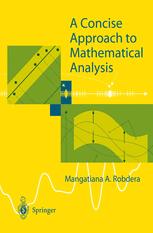

Most ebook files are in PDF format, so you can easily read them using various software such as Foxit Reader or directly on the Google Chrome browser.
Some ebook files are released by publishers in other formats such as .awz, .mobi, .epub, .fb2, etc. You may need to install specific software to read these formats on mobile/PC, such as Calibre.
Please read the tutorial at this link: https://ebookbell.com/faq
We offer FREE conversion to the popular formats you request; however, this may take some time. Therefore, right after payment, please email us, and we will try to provide the service as quickly as possible.
For some exceptional file formats or broken links (if any), please refrain from opening any disputes. Instead, email us first, and we will try to assist within a maximum of 6 hours.
EbookBell Team

5.0
60 reviewsA Concise Approach to Mathematical Analysis introduces the undergraduate student to the more abstract concepts of advanced calculus. The main aim of the book is to smooth the transition from the problem-solving approach of standard calculus to the more rigorous approach of proof-writing and a deeper understanding of mathematical analysis. The first half of the textbook deals with the basic foundation of analysis on the real line; the second half introduces more abstract notions in mathematical analysis. Each topic begins with a brief introduction followed by detailed examples. A selection of exercises, ranging from the routine to the more challenging, then gives students the opportunity to practise writing proofs. The book is designed to be accessible to students with appropriate backgrounds from standard calculus courses but with limited or no previous experience in rigorous proofs. It is written primarily for advanced students of mathematics - in the 3rd or 4th year of their degree - who wish to specialise in pure and applied mathematics, but it will also prove useful to students of physics, engineering and computer science who also use advanced mathematical techniques.